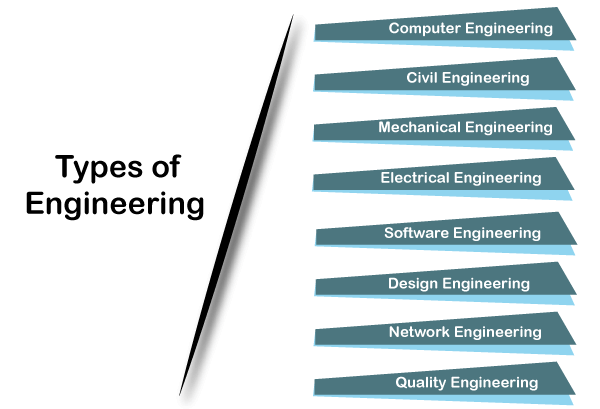Types of Engineering

Engineering is a diverse field with various branches, each specializing in specific areas of technology, design, and problem-solving. Here are brief descriptions of some common types of engineers:
- Chemical Engineering: Chemical engineering focuses on applying principles of chemistry, physics, and mathematics to design, manufacture, and operate processes that transform raw materials into valuable products. Chemical engineers work in industries such as pharmaceuticals, petrochemicals, food processing, and environmental engineering. They are involved in developing processes for chemical reactions, optimizing production, and ensuring safety and environmental compliance.
- Civil Engineering: Civil engineering deals with the design, construction, and maintenance of infrastructure and large-scale projects that support society’s needs. This includes roads, bridges, buildings, airports, water supply systems, sewage systems, and more. Civil engineers play a crucial role in ensuring the safety, functionality, and sustainability of public and private infrastructure projects.
- Electrical Engineering: Electrical engineering focuses on the study and application of electricity, electromagnetism, and electronics. Electrical engineers design, develop, and maintain electrical systems, devices, and components. This can range from power generation, transmission, and distribution to designing circuits, communication systems, control systems, and consumer electronics.
- Mechanical Engineering: Mechanical engineering is one of the broadest engineering disciplines that deals with the design, analysis, manufacturing, and maintenance of mechanical systems. Mechanical engineers work on a wide range of projects, including engines, machinery, HVAC systems, robotics, and more. They apply principles of physics, materials science, and thermodynamics to develop efficient and reliable mechanical systems.
Other Kinds of Engineering
- Computer Engineering: Computer engineering combines aspects of electrical engineering and computer science. Computer engineers are involved in the design and development of computer hardware, software, and networking systems. They work on computer architecture, microprocessors, embedded systems, and various computing devices, including computers, smartphones, and tablets.
- Aerospace Engineering: Aerospace engineering focuses on the design and development of aircraft, spacecraft, satellites, and related systems. Aerospace engineers deal with aerodynamics, propulsion systems, materials, and the challenges of operating in space or high-altitude environments. They work in both the private and public sectors, contributing to the aerospace industry’s growth and innovation.
- Biomedical Engineering: Biomedical engineering combines principles of engineering and biology to develop technologies and solutions for healthcare and medical applications. Biomedical engineers work on medical devices, prosthetics, imaging systems, tissue engineering, and other advancements in medical technology that improve the quality of life and medical treatments.
- Environmental Engineering: Environmental engineering is dedicated to addressing environmental challenges and sustainability. Environmental engineers work on projects related to water and air pollution control, waste management, renewable energy systems, and environmental impact assessments. They contribute to creating a cleaner and more sustainable world.
Which is the Best Field in Engineering?
The “best” field in engineering depends on various factors, including individual interests, skills, and career goals. Different engineering fields offer unique opportunities and challenges, and what may be considered the best field for one person might not be the same for another.
Each engineering discipline has its significance and plays a vital role in different industries and sectors. Here are some popular engineering fields, along with their respective strengths:
- Software Engineering: With the rapid advancement of technology and the increasing reliance on software, software engineering offers excellent career prospects. It involves the design, development, testing, and maintenance of software applications and systems.
- Electrical Engineering: This field is essential for power generation, transmission, and distribution, as well as the design of electrical systems and devices. Electrical engineers are also crucial in the development of various electronics and communication technologies.
- Civil Engineering: Civil engineers are responsible for the design and construction of infrastructure projects, including roads, bridges, buildings, and water supply systems. Civil engineering is essential for urban development and public welfare.
- Mechanical Engineering: Mechanical engineers work on various projects, from designing machinery to creating HVAC systems. Their skills are highly sought after in industries like manufacturing, automotive, aerospace, and robotics.
- Chemical Engineering: Chemical engineers are involved in transforming raw materials into valuable products in industries like pharmaceuticals, petrochemicals, food processing, and environmental engineering.
- Aerospace Engineering: Aerospace engineers work on the design and development of aircraft, spacecraft, and related systems, making them valuable in the aerospace and defense industries.
- Biomedical Engineering: This field combines engineering principles with biology and medicine to develop medical devices, prosthetics, and healthcare technologies.
